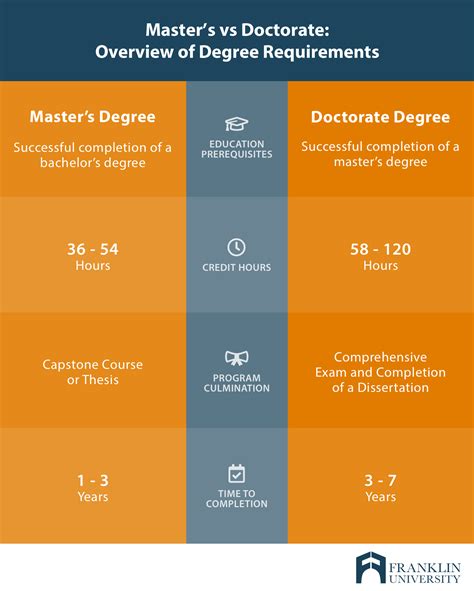Introduction
Pursuing a doctorate is a significant investment in your education and career. Whether you choose a Doctorate in Engineering (EngD) or a Doctor of Philosophy (PhD), the time and effort required can be substantial. Understanding the differences between these two degrees is crucial in making an informed decision about which path aligns best with your aspirations.

Time Commitment
Doctorate in Engineering (EngD)
An EngD typically takes three to five years to complete, with a focus on applied research and practical engineering solutions. It combines coursework, research, and industry experience, providing a blend of theoretical knowledge and hands-on skills.
PhD
A PhD generally takes four to seven years to complete, with a stronger emphasis on theoretical research and original contributions to the field. It requires extensive coursework, laboratory research, and a dissertation that makes a significant contribution to the scientific community.
Career Prospects
Doctorate in Engineering (EngD)
EngD graduates are highly sought after by industries seeking engineers with advanced technical and problem-solving abilities. They often transition to roles in engineering design, project management, consulting, and research and development.
PhD
PhD graduates pursue careers in academia, research institutions, and government agencies. They excel in research, teaching, and scientific leadership. Many PhD holders also establish their own research labs or companies.
Table 1: Key Differences Between EngD and PhD
| Feature | Doctorate in Engineering | PhD |
|---|---|---|
| Time Commitment | 3-5 years | 4-7 years |
| Focus | Applied research, industry experience | Theoretical research, original contributions |
| Career Prospects | Engineering leadership, industry roles | Academia, research institutions, government agencies |
Table 2: Average Completion Times by Field
| Field | EngD Completion Time (Years) | PhD Completion Time (Years) |
|---|---|---|
| Chemical Engineering | 3.5 | 5.5 |
| Electrical Engineering | 3.8 | 6.2 |
| Mechanical Engineering | 4.0 | 6.5 |
| Biomedical Engineering | 4.2 | 6.8 |
Table 3: Median Salaries by Degree and Experience
| Years of Experience | EngD Median Salary | PhD Median Salary |
|---|---|---|
| 0-5 | $105,000 | $110,000 |
| 5-10 | $125,000 | $135,000 |
| 10+ | $140,000 | $150,000 |
Table 4: Questions to Ask Yourself
Before choosing between an EngD and PhD, ask yourself these questions:
- What are my career goals?
- Am I more interested in applied research or theoretical research?
- Do I want to work in industry or academia?
- How much time am I willing to commit to graduate studies?
Tips and Tricks
- Consider your career goals. Determine which degree aligns better with your aspirations and industry requirements.
- Research potential programs. Explore different universities and programs to find ones that offer the focus and resources you need.
- Consult with professionals in the field. Seek advice from engineers, professors, and hiring managers to gain insights into the job market and career paths.
- Explore scholarships and funding options. Secure funding sources to reduce the financial burden of graduate studies.
- Network with peers and mentors. Build relationships with other students and experts to gain support and valuable knowledge.
Common Mistakes to Avoid
- Choosing the wrong degree for your career goals. Carefully consider your aspirations and industry demands before committing to a particular degree.
- Underestimating the time commitment. Be realistic about the workload and time required to complete a doctorate.
- Not researching programs thoroughly. Take the time to explore different universities and programs to find the best fit for your needs.
- Neglecting networking and mentorship. Building relationships with professionals in the field is essential for career growth and support.
- Getting discouraged. Graduate studies can be challenging. Stay motivated and seek support from peers and mentors.
Conclusion
Choosing between a Doctorate in Engineering (EngD) and a PhD is a significant decision that requires careful consideration. By understanding the time commitment, career prospects, and key differences between these degrees, you can make an informed choice that aligns with your aspirations. Remember, the journey to a doctorate is a transformative experience that will open up a world of opportunities in engineering and research.
